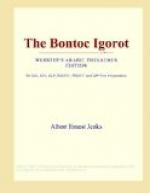Most of the widowed live in the katyufong, the smaller dwelling of the poor. The reason for this is that even if one has owned the better class of dwelling, the fayu, it is generally given to a child at marriage, the smaller house being sufficient and suitable for the lone person, especially as the widowed very frequently take their meals with some married child.
Orphans
Orphans without homes of their own become members of the household of an uncle or aunt or other near relative. The property they received from their parents is used by the family into whose home they go. Upon marriage the children receive the property as it was left them, the annual increase having gone to the family which cared for them.
If there are no relatives, orphans with property readily find a home; if there are neither relatives nor property, some family receives the children more as servants than as equals. When they are married they are usually not given more than a dwelling.
The aged
There are few old and infirm persons who have not living relatives. Among these relatives are usually descendants who have been materially benefited by property accumulated or kept intact by their aged kin. It is the universal custom for relatives to feed and otherwise care for the aged. Not much can be done for the infirm, and infirmity is the beginning of the end with all except the blind.
The chances are that the old who have no relatives have at least a little property. Such persons are readily cared for by some family which uses the property at the time and falls heir to it when the owner dies. There are a very few blind persons who have neither relatives nor property, and these are cared for by families which offer assistance, and two of these old blind men beg rice from dwelling to dwelling.
Sickness, disease, and remedies
All disease, sickness, or ailment, however serious or slight, among the Bontoc Igorot is caused by an a-ni’-to. If smallpox kills half a dozen persons in one day, the fell work is that of an a-ni’-to; if a man receives a stone bruise on the trail an a-ni’-to is in the foot and must be removed before recovery is possible. There is one exception to the above sweeping charge against the a-ni’-to — the Igorot says that toothache is caused by a small worm twisting and turning in the tooth.
Igorot society contains no person who is so malevolent as to cause another sickness, insanity, or death. So charitable is the Igorot’s view of his fellows that when, a few years ago, two Bontoc men died of poison administered by another town, the verdict was that the administering hands were directed by some vengeful or diabolical a-ni’-to.
As a people the Bontoc Igorot are healthful. It is seldom that an epidemic reaches them; bubonic plague and leprosy are unknown to them.




